On November 21 & 22, 2022, Inclusion Canada and People First of Canada hosted their 14th federal policy forum on inclusion.
Day 1 of the event was called Inclusion at Work. We explored youth employment and discussed the role of the national employment strategy in creating more inclusive career opportunities for people with an intellectual disability.
Day 2 of the event was called Justice for All. We looked at the role of police, courts, and corrections systems in providing accessible and equitable access to justice for people with an intellectual disability.
This year’s event was held online over two half-days. This helped make the policy forum accessible to more people across the country. It also allowed us to offer a wide range of accessibility features like French simultaneous interpretation, ASL, LSQ, and English and French CART captioning. A recording of the event was also provided to everyone who registered.
Day 1 – Inclusion at Work
We started the day with a land acknowledgment and accessibility summary led by Donna Brown, 1st Vice-President of People First of Canada.
Next, Dewlyn Lobo, President of People First of Canada, and Robin Acton, President of Inclusion Canada delivered opening remarks.
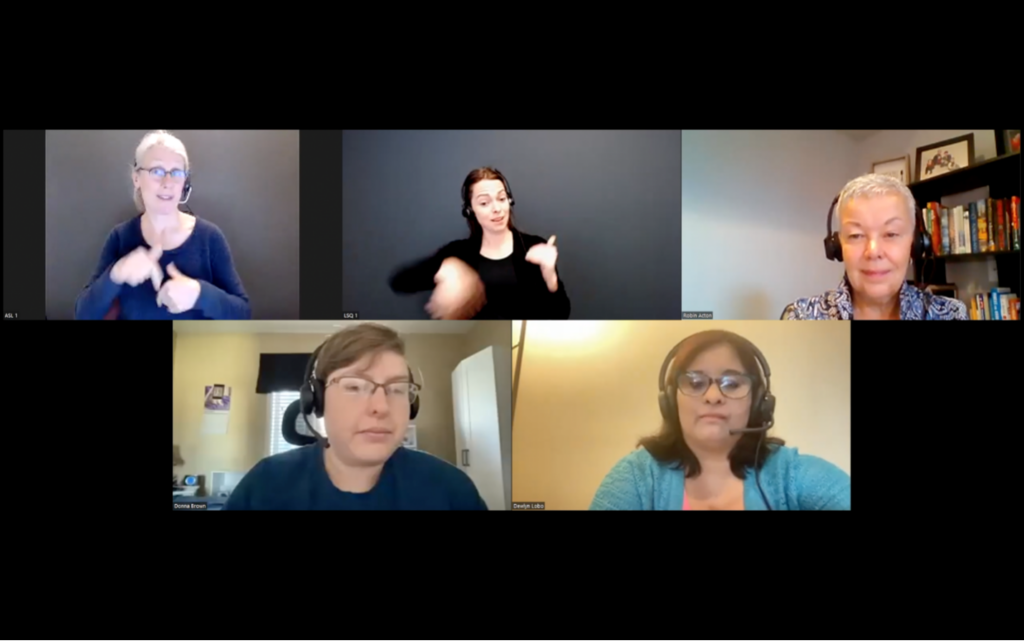
From top left to bottom right: ASL interpreter, LSQ interpreter, Robin Acton, Donna Brown, Dewlyn Lobo.
The Honourable Kamal Khera, Minister of Diversity, Inclusion, and Persons with Disabilities offered opening remarks. She spoke about the United Nations’ International Day of Persons with Disabilities and this year’s theme of being “United in Action”. She shared the importance of a whole government approach to building a more inclusive, accessible, and diverse Canada.

Minister Khera highlighted milestones like the passage of the Accessible Canada Act and the recent legislation creating the Canada Disability Benefit. She invited the community to participate in an online consultation to help shape the regulations for the new benefit.
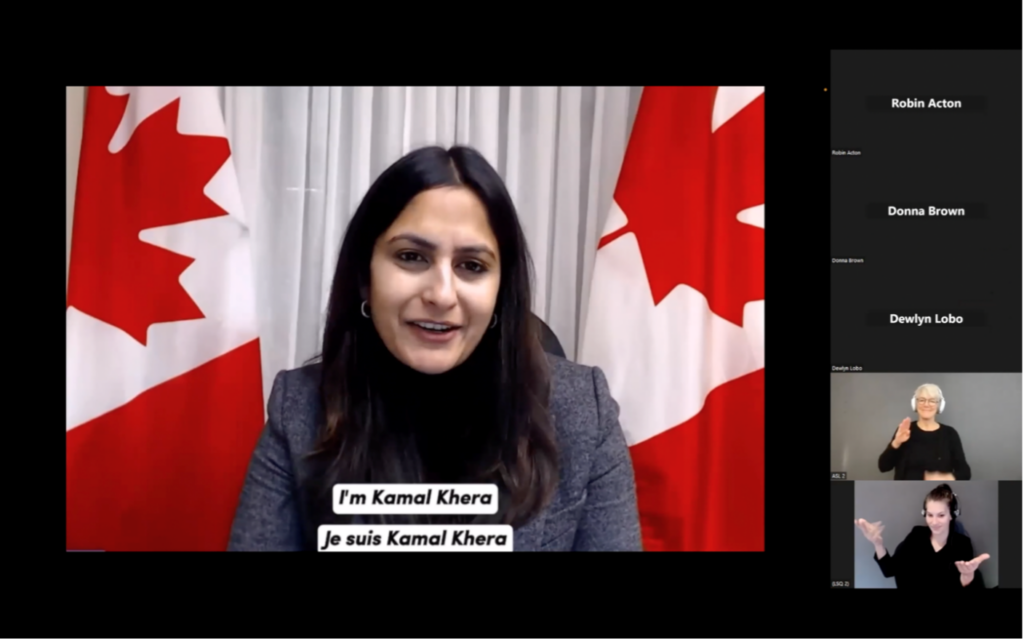
Kamal Khera, Minister of Diversity, Inclusion, and Persons with Disabilities sits in front of two Canada flags. English and French captions are visible on screen in front of her. ASL and LSQ interpreters are also visible on the screen.
Day 1 Keynote
Our Day 1 keynote speaker was Kiana Scott. Kiana is a young woman from Manitoba who shared her insights and experiences of growing up with autism, and her journey to work in Winnipeg. Kiana talked about her work at IKEA and how an app called Routine Factory has helped her with her schedule both at work and at home.
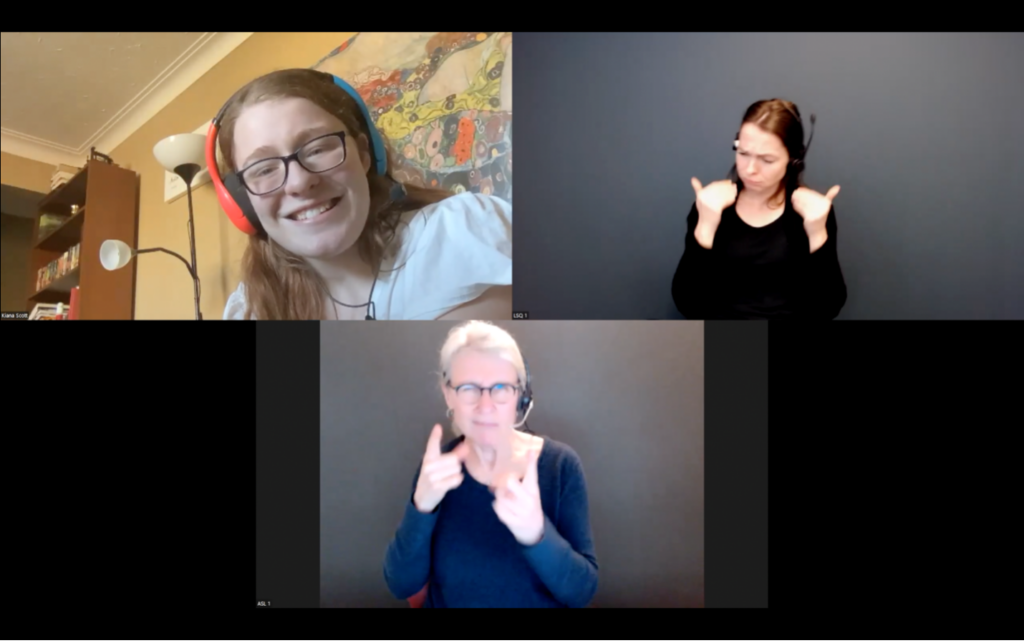
Kiana Scott smiles at the camera. She is wearing a red and blue headset. ASL and LSQ interpreters are also visible on the screen.

Next, we watched a video of a young man from New Brunswick named Owen. Owen works in the trades. He and his supervisor talked about his employment journey and how real pay should be the expectation for everyone, whether they have a disability, or not.
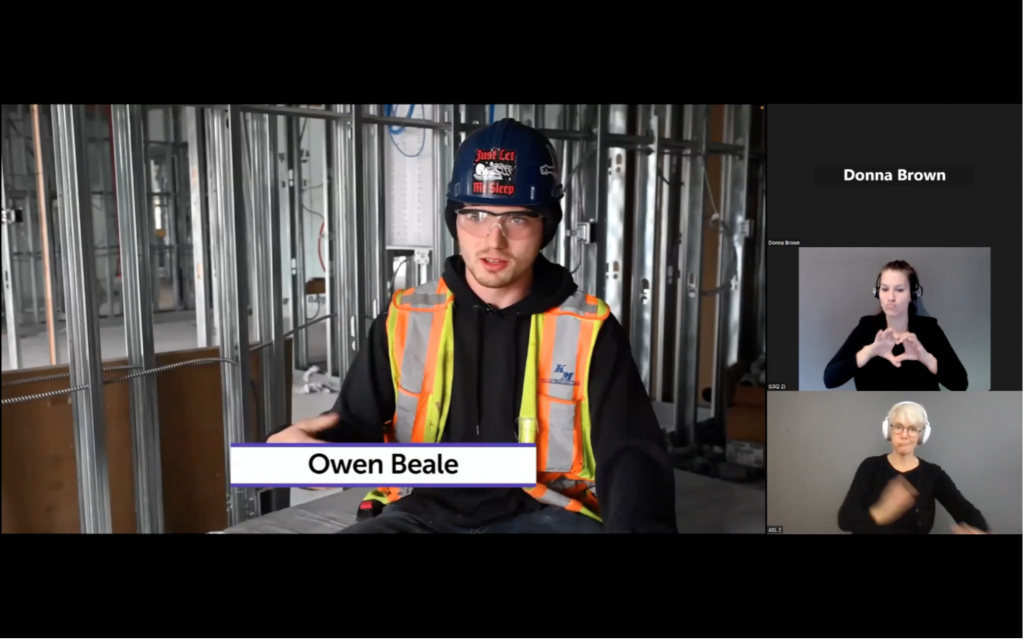
Owen Beale speaks to the camera while sitting at a construction site. He is wearing a hard hat, safety glasses and a yellow and orange reflective vest. ASL and LSQ interpreters are also visible on the screen.

Session 1 Expecting more, demanding better: Youth employment and career success
Takara Lockyer, the chairperson of People First of Canada’s Youth Committee kicked off the presentations. She talked about struggles she experienced with not receiving the support she needed at design college. She also shared her positive experience of working at Walmart and her aspirations of becoming a supervisor. Takara also runs her own small business, Takara’s Creative Designs making custom t-shirts, mugs, and other items.
Next, we heard from Anne McWhir, an Alberta-based parent. She shared her son Steven’s story and the important role that paid work has played in his life. We heard about how Steven’s work experience taught him resilience and led him to a full-time permanent job with Alta Gas. During the pandemic, Steven had to go on long-term disability, but his family is confident that the transferable life skills he acquired through work will support him in the next chapter of his life.
Carolyn Tinglin, the Executive Director of the Youth Alliance for Intersectional Justice spoke next. She talked about the Youth Employment Futures Program that connects Black and racialized youth with disabilities to meaningful work. Through storytelling and quotes, Carolyn shared the importance of mentorship, and what it means to be “both ignored and constantly focused on at the same time” (quote excerpt from Amiri Baraka).
Carolyn’s Powerpoint presentation is available in English.
Shawna Francis is the Provincial Director of Inclusive Post-Secondary Education with Inclusion Alberta. She explained the key role that inclusive education plays in leading to inclusive employment. Shawna highlighted what it means to have an inclusive post-secondary experience that is authentic and ensures students with disabilities share in the successes and struggles of their fellow students.
Shawna’s PowerPoint presentation is available in English.
Last, we heard from Rhonda Fernandes, Director General of the Youth and Skills Innovation Directorate, Skills and Employment Branch. She spoke about existing federal government programs and how they are aiming to provide flexible support that meets people’s individual needs. She highlighted the importance of programs that not only help people get a job, but also support them to keep their job. Rhonda talked about listening to people with lived experience, supporting employers, adapting to remote work, and the need for quality mental health support.
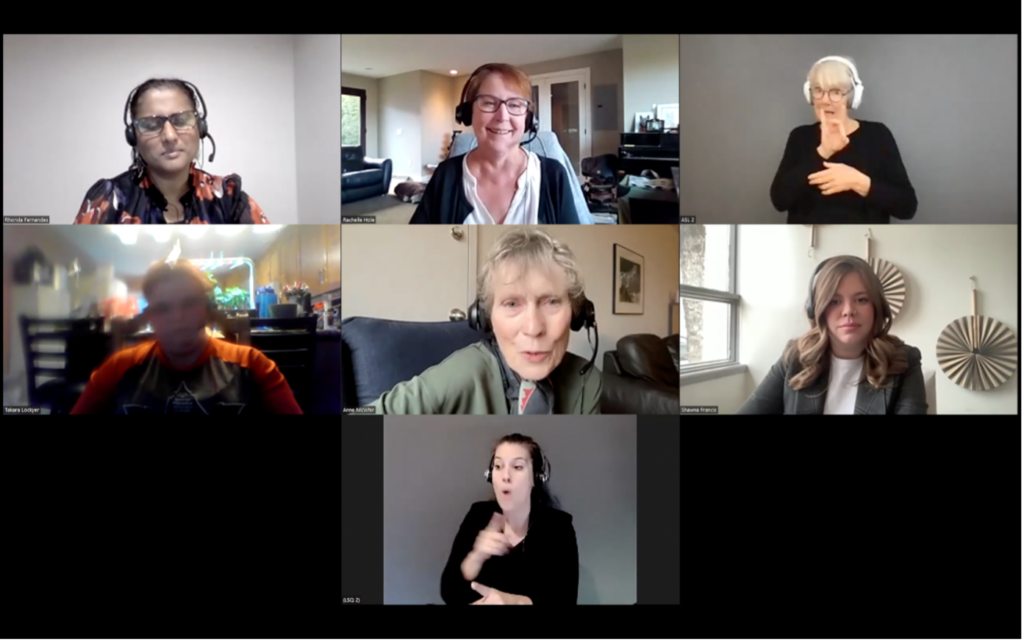
Session 1 speakers on a Zoom screen. From top left to bottom right: Rhonda Fernandes, Rachelle Hole (moderator), ASL interpreter, Takara Lockyer, Anne McWhir, Shawna Francis, LSQ interpreter. Missing from the photo: Carolyn Tinglin.
Session 2 I want a job: Designing a National Employment Strategy that works for me
Tina Millar is the President of People First of Saskatchewan and a member of the People First of Canada Board. She was our first speaker for Session 2. Tina and her support person Catherine Rodgers modeled what inclusive and meaningful participation can look like, by delivering her presentation together using an interview-style dialogue. Tina shared her experience of completing an education assistance certificate at college by studying part-time over 6 years. While studying, Tina also began working at Safeway and became involved in the union there. She explained how the union supports the employment of people with disabilities and encouraged others to get involved.
Paula Fleming is a parent from New Brunswick. She shared her experience of raising her daughter, Olivia, and the role that Inclusion NB has played in supporting Olivia to go to work. Paula highlighted the importance of having an advocate who can help employers understand a disability and how to accommodate it.
The next speaker was Maureen Haan, President and CEO of the Canadian Council on Rehabilitation and Work (CCRW). CCRW led the national community consultations about the Employment Strategy for Persons with Disabilities. Maureen shared what CCRW heard during this consultation process including some key takeaways:
- There is a need for support for both employers and jobseekers
- There are gaps related to recruitment, getting a job, and accommodations at work.
- There is a high need for supports that allow people to work like childcare and transportation.
Maureen’s PowerPoint presentation is available in English.
The last presenter of the day was Eppo Maertens. Eppo is a Policy Director with Labour Market Inclusion and Accessibility, Employment and Social Development Canada. He spoke about the development of the Employment Strategy for Persons with Disabilities. He highlighted the strategy’s 3 goals:
- to support individuals to find and maintain jobs, advance in their careers, or become entrepreneurs
- to support employers to diversify their workforces by creating inclusive and accessible workplaces
- and to increase the supply, capacity, and reach of individuals and organizations that work to support disability inclusion and accessibility in employment
Eppo also spoke about federal initiatives like the Opportunities Fund and financial investments that have been made to help implement the goals through these programs.
Eppo’s PowerPoint is available in English and French.
Day 2 – Justice for All
Day 2 began with a land acknowledgement followed by opening remarks from Donna Brown, 1st Vice-President of People First of Canada, and Moira Wilson, Vice President of Inclusion Canada.
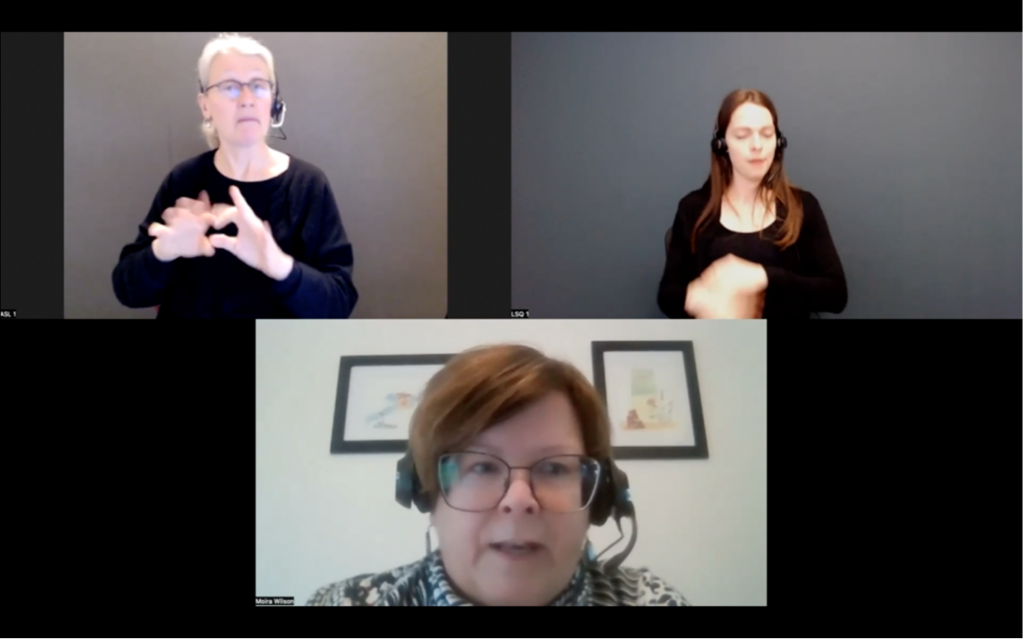
Moria Wilson speaks to the camera. She is wearing a black headset and glasses. ASL and LSQ interpreters are also visible on the screen.
Day 2 Keynote
Next was our Day 2 keynote speaker, Professor Janine Benedet. Professor Benedet’s research focuses on legal responses to sexual violence against women. In 2020, she acted as counsel for Inclusion Canada in its intervention in the Supreme Court of Canada case of R. versus Slatter.
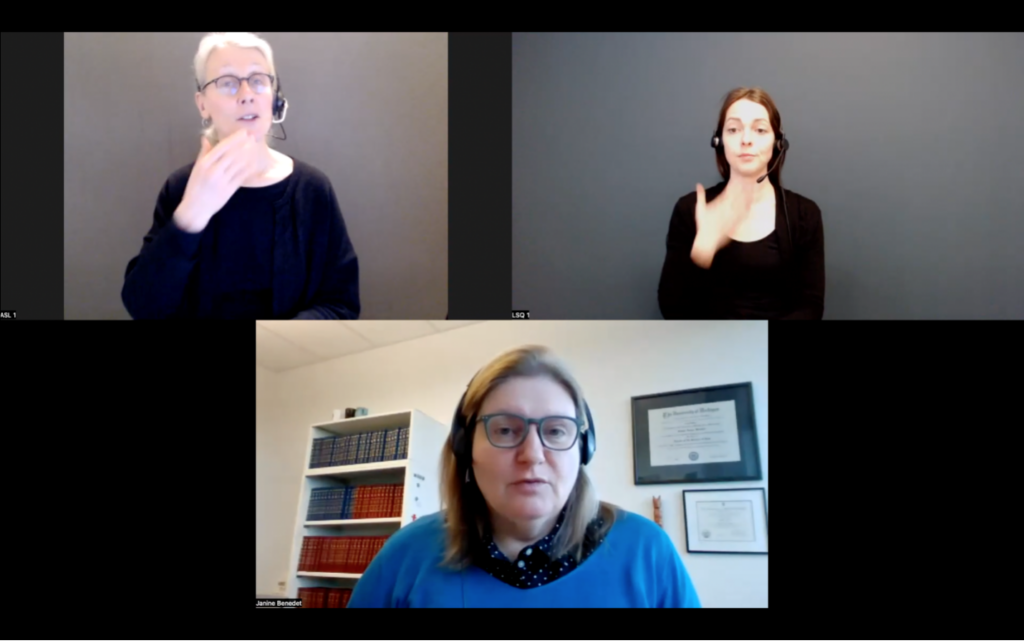
Janine Benedet speaks to the camera. She is wearing a blue sweater with a black polka dot shirt underneath. ASL and LSQ interpreters are also visible on the screen.
Professor Benedet explained the Slatter case and how a young woman with an intellectual disability was sexually assaulted. She explained why this case was so important:
- Women and girls with an intellectual disability are targeted for sexual violence at very high rates – 4 times more than women without disabilities
- Women with an intellectual disability are less likely to report sexual assault, and less likely to be believed when they do report
- The criminal trial process is not a very welcoming place for any women, especially for women with an intellectual disability

Professor Benedet also talked about some of the things that need to change to make sure women with an intellectual disability have equal access to justice:
- The criminal justice system needs to stop treating women with an intellectual disability like children (infantilizing them). Courts often talk about people’s “mental age”. They think they are helping by doing this, but it is demeaning – it takes away their dignity and respect. It also makes people think that they are not a reliable witness in court.
- The criminal justice system needs to be careful about using expert witnesses. Women with an intellectual disability should not have to answer personal questions or go through tests that other witnesses without a disability don’t.
- The criminal justice system should think about a person’s ability to consent to sexual activity based on the situation instead of being “all or nothing”. Saying that a woman with an intellectual disability is never capable of consenting to sex focuses on her limitations. It also takes away her ability to ever have a relationship where she consents to sex.

Learn more about Inclusion Canada’s (formerly the Canadian Association of Community Living) intervention in the Slatter case.
Learn more about Professor Benedet’s work on Sexual Assault of Women and Adolescent Girls with Mental Disabilities
Session 3: Policing and Prisons: Rights and realities of people with an intellectual disability
Chris Rowley started off session 3. Chris is the 2nd Vice-President of People First of Canada. He shared his first-hand experience of interacting with and being arrested by the police. At the time, Chris was advocating at an encampment for people who are unhoused. During his arrest, Chris chose to disclose his disability so that the police could better understand him. He also talked about the important role his support system played in helping him navigate this experience. He explained how human rights, disability, poverty, justice, and police action all intersect and there are many gaps that people fall through during these incidents.

Billie Jack is the Executive Director of Advocacy and Family Initiatives with Inclusion Alberta. She shared the story of a young man with an intellectual disability who is facing deportation because of criminal charges against him. Billie described the prejudice and lack of support this young man experienced in the justice system. She spoke about the need for policing to prioritize compassion, inclusion, and support services that are tailed to people’s individual needs.

The next speaker was Chris Fillion. Chris is the Program Coordinator with Visions & Voices. Chris spoke about his personal experience with FASD and supporting others through Visions & Voices. He explained that when people with an intellectual disability interact with the justice system, they don’t always fully understand what is happening. This is why it’s so important for police and lawyers to be able to explain things in plain language. Chris also spoke about systemic issues like lack of phone access or reliable transportation that make it hard for people with disabilities to meet the terms of their probation. He explained thar more supports are needed to help people with an intellectual disability to be treated fairly in the justice system.
Last we heard from Bev Pitcher. Bev is a Regional Program Manager for Ontario working with Correctional Services Canada. She talked about the Integrated Correctional Program Model (ICPM). This adapted program is designed to meet the needs of people with diverse health needs, learning needs, or disabilities. Using resource toolkits, and being flexible in the approach, program facilitators are able to work effectively with offenders with diverse needs.
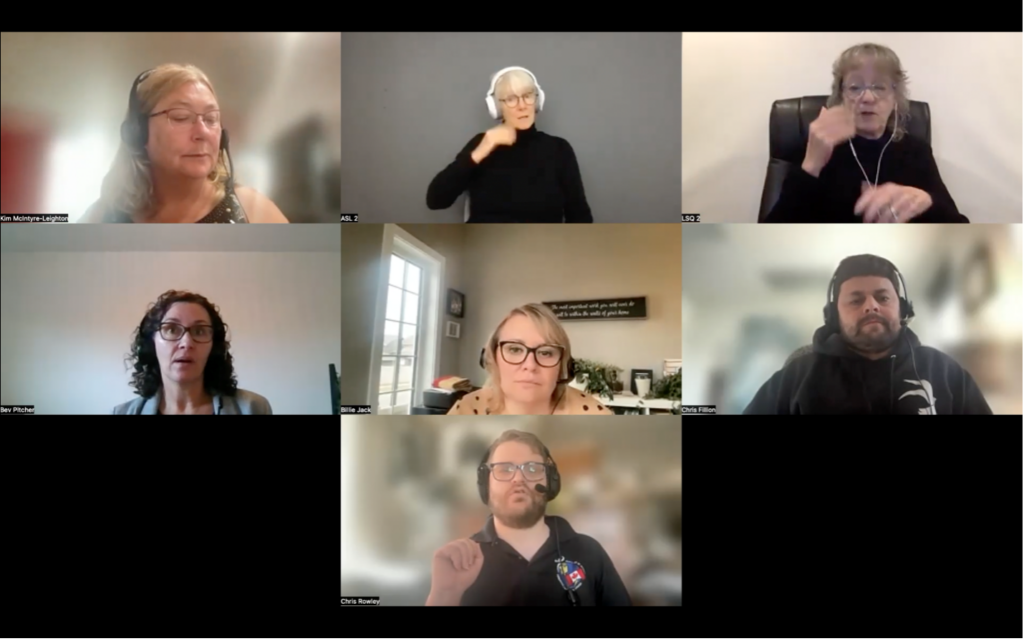
Session 3 speakers on a Zoom screen. From top left to bottom right: Kim McIntyre-Leighton (moderator), ASL interpreter, LSQ interpreter, Bev Pitcher, Billie Jack, Chris Fillion, Chris Rowley
Session 4: Courts, and Corrections: Access and Equity in the justice system
Russ Hilsher is involved with Visions & Voices. Visions and Voices is a speakers’ bureau of adults with Fetal Alcohol Spectrum Disorder (FASD). Russ shared that he has had a bad experience with the justice system but was able to get through it because of his support network. He talked about how people with an intellectual disability and overrepresented in the justice system. He explained that more training needs to be done for police and correctional officers at all levels.
Next, we heard from Bluesette Campbell. Bluesette is a parent, and also the President of Inclusion Saskatchewan. With her son’s permission, she shared their family’s experience with the justice system. She explained that she wants to be part of a world where we collectively learn from past experiences, and that happens through sharing our stories. She talked about the barriers their family experienced like being denied access to plain language documents and dealing with police, crown prosecutors, investigators, and judges who held ableist beliefs and lacked awareness and training.

The last presenter of the day was David Rosenfeld. David R. is the lawyer that represented David Weremy in a class-action lawsuit against the Manitoba Developmental Centre – a large institution where many people with intellectual disability lived. He explained that many people were hurt physically, sexually, and emotionally at the Manitoba Developmental Centre. The institution is closing in 2024. The premier of Manitoba apologized to the survivors of the institution, and there is money for programs to help survivors tell their stories and to support people with disabilities in Manitoba. As a lawyer, David R. talked about the different supports that they used to make sure that David Weremy could understand and fully participate in the court process. This included supports like using plain language, having extra time, and having communication assistance. He explained that courts are required to follow human rights laws and encouraged people to push for human rights accommodations.
Learn more about the settlement of the Manitoba Developmental Centre lawsuit.

Session 4 speakers on a Zoom screen. From top left to bottom right: LSQ interpreter, ASL interpreter, Kurt Goddard (moderator), Bluesette Campbell, David Rosenfeld, Russ Hilsher
Summary and Closing
Krista Wilcox is the Director General with the Office for Disability Issues. Krista joined Shelley Fletcher (Executive Director, People First of Canada) and Krista Carr (Executive Vice-President, Inclusion Canada) to wrap-up this year’s event and highlight some of our key learnings.
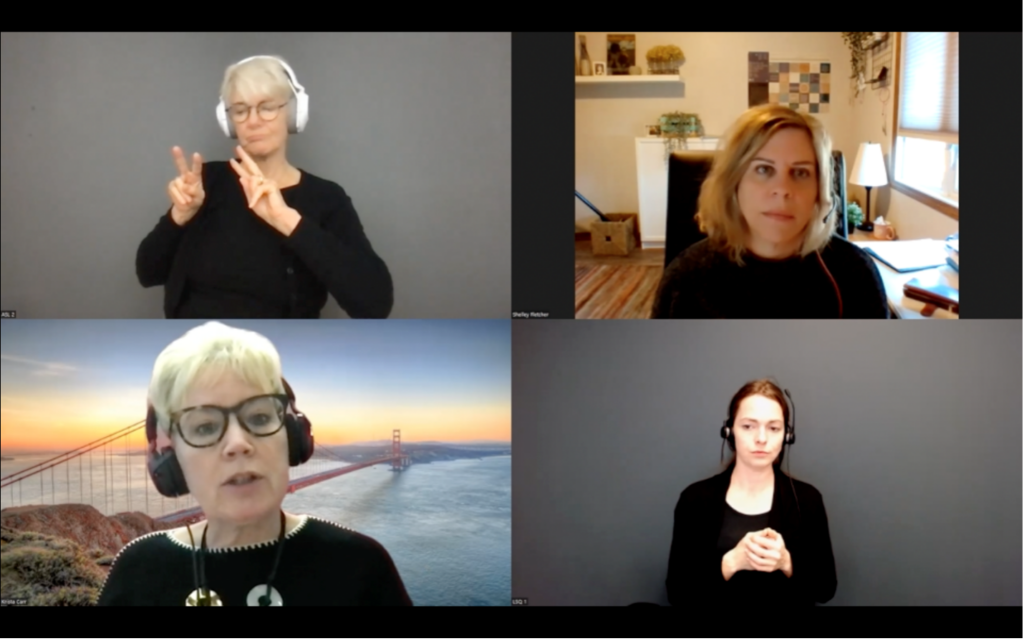
From top left to bottom right: ASL interpreter, Shelley Fletcher, Krista Carr, LSQ interpreter
Inclusion Canada and People First of Canada are so grateful to all the people who contributed their time and expertise to make this event possible. We would also like to thank the community for coming together to listen, learn, and take action to create a more inclusive Canada.
